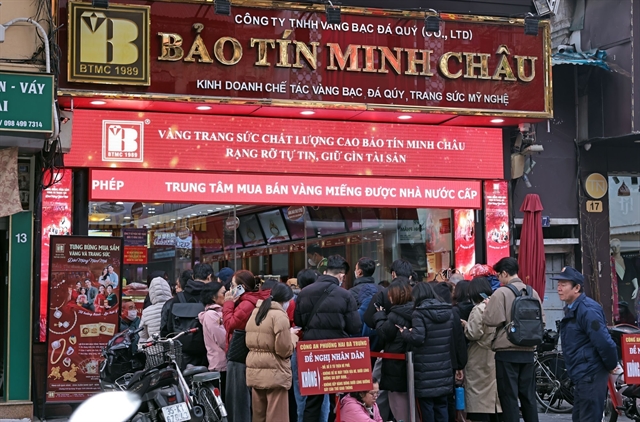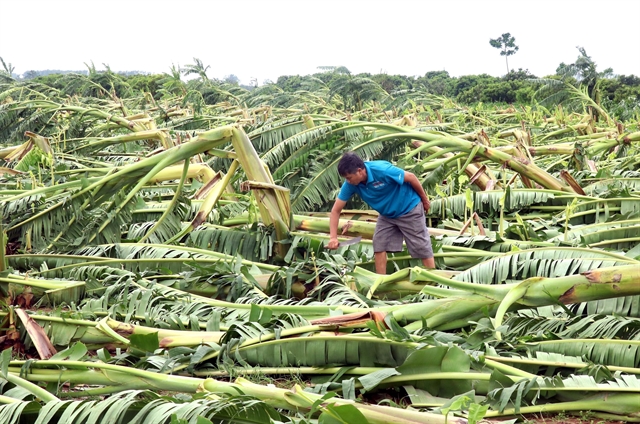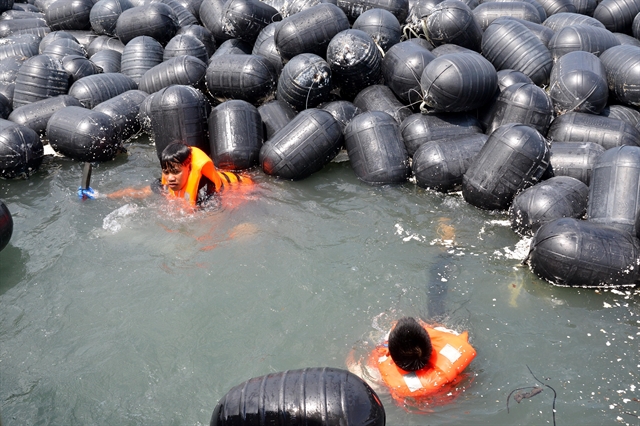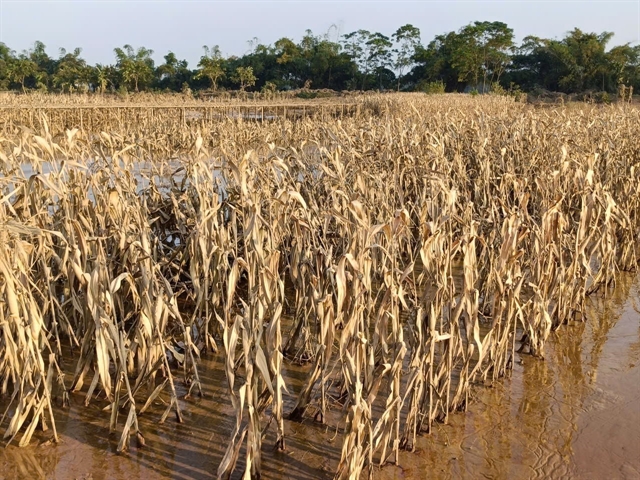 Business Beat
Business Beat


|
| A banana farm in Hưng Yên Province was devastated by Typhoon Yagi. Agriculture is among sectors heavily affected by natural disasters, thus, agricultural insurance should be developed to encourage farmers to take up. VNA/VNS Photo Đinh Văn Nhiều |
Compiled by Mai Linh
The heavy damage caused by Typhoon Yagi on the farming sector in early September has raised questions about the role of insurance in an economy where agriculture is considered an important pillar.
According to initial estimates, the typhoon and its aftermath swept away more than VNĐ50 trillion (US$2 billion) worth of assets which might slow down the GDP expansion rate this year by 0.15 percentage points from the growth scenario of 6.8-7 per cent.
Phùng Đức Tiến, deputy minister of Agriculture and Rural Development, said that agriculture was badly hit, especially husbandry and aquaculture. The ministry’s initial estimates showed that the aquaculture suffered damage of VNĐ2.5 trillion and husbandry VNĐ2 trillion.
Nguyễn Hữu Hợi who has a greenhouse in the suburban district of Đan Phượng, Hà Nội, said that he suffered a damage of more than VNĐ1 billion due to Yagi. “I did not buy agricultural insurance. When natural disasters or risks occur, I must accept the damage,” he said.
Lê Ngọc Huê, director of An Thái Hưng Company in Thái Bình Province, said that his nine-hectare banana farm was totally destroyed by the typhoon, with an estimated loss of about VNĐ5 billion.
“Investing in agriculture is risky and hard. Coupled with natural disasters, it is even more difficult,” he said, adding that support should be provided to farmers and agricultural businesses to participate in agricultural insurance.
Agricultural insurance is not popular in Việt Nam, partly because of low awareness of farmers, he said. Besides, low and unstable income from agricultural production together with unclear agricultural insurance policy deter farmers from participation.
Why inefficient?

|
| Buoys for oyster farming are collected to restart production in Quảng Ninh Province after typhoon Yagi. Agriculture insurance, which is designed to help farmers avoid financial losses, became available in Việt Nam in 1982, but has not been widely taken up. VNA/VNS Photo Thanh Vân |
According to the Insurance Supervisory Authority, under the Ministry of Finance, natural hazards and diseases rob farmers of an estimated 1.5 per cent of GDP each year.
Agriculture insurance, which is designed to help farmers avoid financial losses, became available in Việt Nam in 1982, but has not been widely taken up.
Through several pilot programmes and officially applied nationwide from 2019, agricultural insurance has failed to play its role.
Ngô Việt Trung, director of the Insurance Supervisory Authority, said that to date 19 out of 32 non-life insurance companies have been licensed to implement agricultural insurance.
However, the premiums of agricultural insurance were modest, at mere VNĐ42.6 billion in 2023, or 0.06 per cent of the total non-life insurance premium.
Despite the request, no insurance company has yet reported on compensation for damage caused by Yagi and its aftermath, up to now.
Nguyễn Văn Định, former head of Insurance Faculty under the National Economics University, said neither insurance companies nor farmers are particularly interested in agricultural insurance.
Farmers' awareness about agricultural insurance remains limited and typically farmers only see the importance of agricultural insurance when any harm has already occurred, he said.
Meanwhile, insurance companies are not interested in offering agricultural insurance products because of low premiums and difficulty in reinsurance, Định said. There are also difficulties in risk management assessment, together with scattered agricultural production scale, causing hesitation in implementing agricultural insurance.
Sharing the same viewpoint, Ngô Trung Dũng, vice president of the Insurance Association, said that the difficulty for insurance companies is risk management.
For instance, insurance companies cannot measure the amount of shrimp and fish in a pond and they must rely on the customers’ declarations. There have also been cases of fishermen taking advantage of insurance by swapping the fishing boats’ machinery then sinking the boats for compensation, which was difficult for insurance companies to monitor.
A representative from Agribank Insurance Joint Stock Corporation (ABIC) said that with unstable income and scattered and fragmented production, farmers have not had financial resources for risk management. Agricultural production is also a risky sector and there has been a lack of coordination between credit institutions, insurance companies and farmers.
Nguyễn Ngọc Anh, deputy director of insurance company Bảo Minh, said that most farmers are simply not aware of buying agricultural insurance.
Besides, farmers tend to have the psychology that if they buy agricultural insurance, they will get compensation whenever actual harm occurs. However, the fact is that insurance cannot cover all the risks, he said.
How not to say 'if only'

|
| Crops were destroyed by the flood in Yên Bái Province. Farmers's awareness about agricultural insurance remains limited and typically farmers only see the importance of agricultural insurance when actual harm already occurs. VNA/VNS Photo |
The Insurance Supervisory Authority said that agricultural insurance is a complicated type of insurance product.
To attract the participation of farmers, it is necessary to enhance cooperation among all relevant parties, including farmers, insurance companies, local authorities, associations, State management agencies and reinsurers, to ensure the stability of policies, protect rights of farmers as well as create favourable conditions for implementation.
Farmers also need to apply and comply with domestic and international standards in production to convince international reinsurers to join domestic insurance companies in promoting the development of agricultural insurance.
Developing modern agriculture and accelerating digital transformation are also important factors to encourage the participation in agricultural insurance.
Early this year, the Prime Minister asked the Ministry of Finance to consider amendments to the Government’s Decree 58 dated on April 18, 2018, on agricultural insurance to ensure feasibility. VNS




